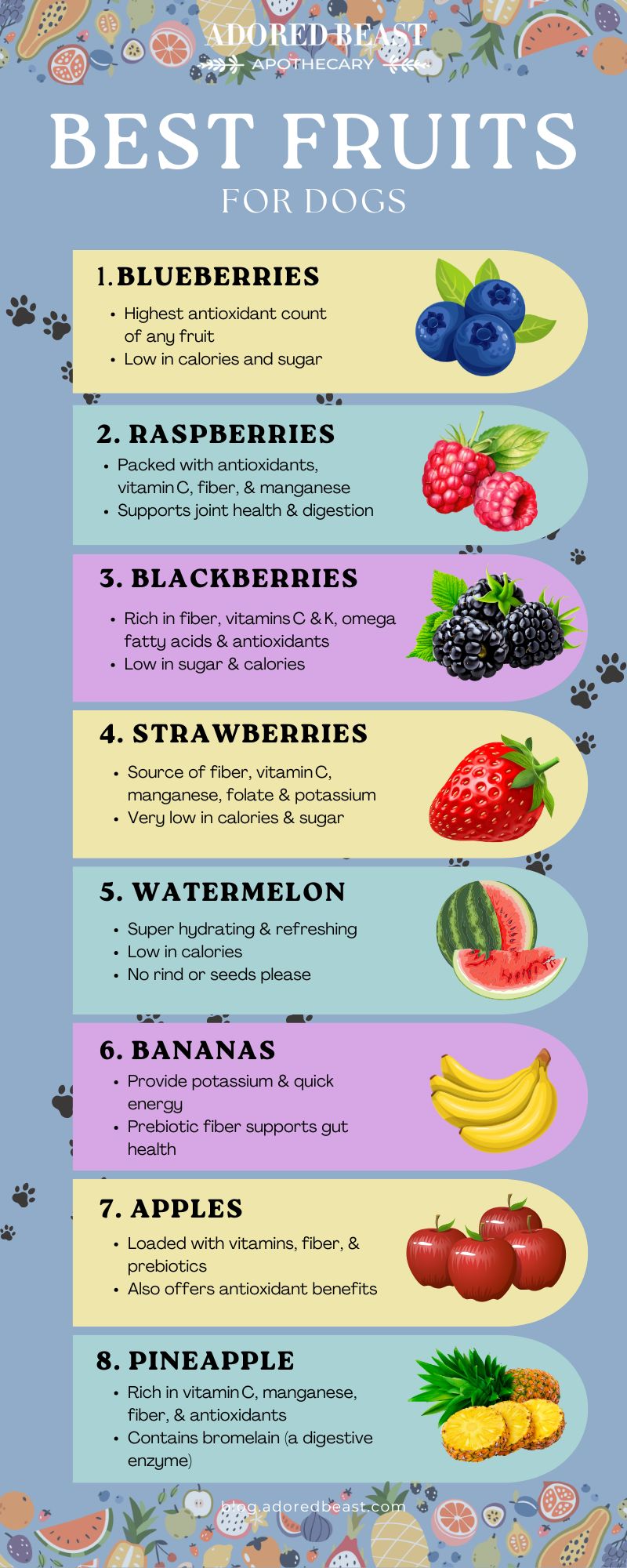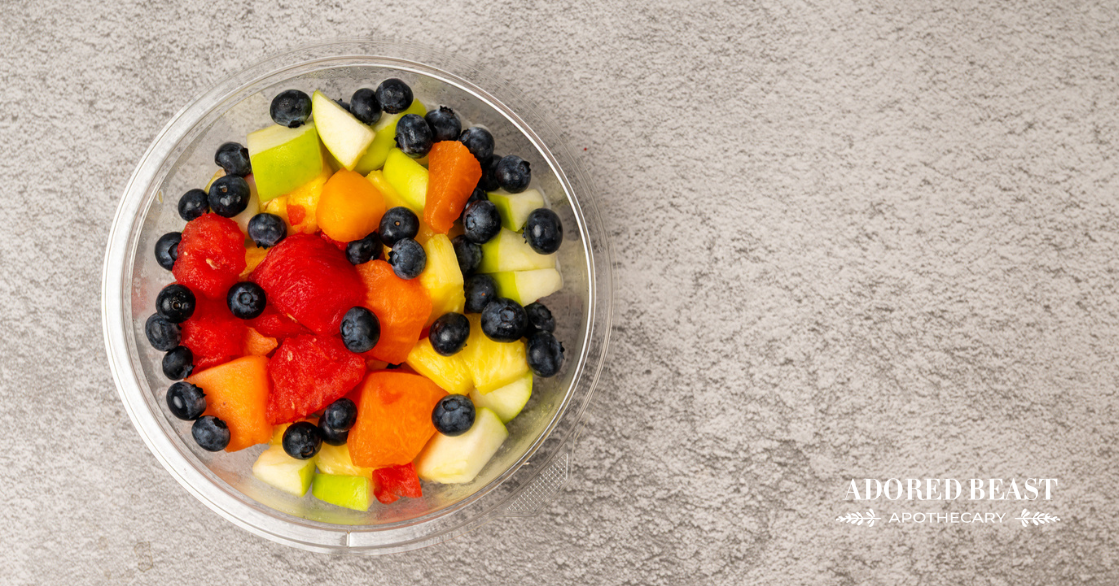We all know that fruits are an important part of a healthy, balanced diet. Incorporating them into your regular diet is a big part of eating healthy. And the same goes for our dogs!!
We regularly add fruits to our dogs’ meals. They’re a great way to add vital nutrients for an added boost. But which ones are at the top of the list? Which are the best fruits for dogs? Here are our top contenders, why we love them, and some tips on rotating.
Our Picks for the Best Fruits for Dogs
Move over, boring biscuits – fruit is stealing the spotlight! 🍓🐶 Many fruits aren’t just safe for sharing, they’re packed with vitamins, fibre, and antioxidants that can help your furry friend stay healthy (and happy). From sweet summer berries to crisp, juicy treats, here’s a look at our picks for the best fruits for dogs.
1. Blueberries
- Highest antioxidant count of any fruit, rich in anthocyanins, quercetin and myricetin—linked to cancer prevention, heart and allergy‑supporting benefits
- Low in calories and sugar, excellent for training treats or mixing into meals.
- Freezing increases antioxidant availability; serve frozen or fresh, rinsing if fresh
2. Raspberries
- Packed with antioxidants, vitamin C, fibre and manganese; contain ellagic acid with anti‑inflammatory and anti‑cancer properties
- Naturally low in sugar/calories—great for weight‑management and immune support.
- Supports joint health and digestion
3. Blackberries
- Rich in fibre, vitamins C & K, omega fatty acids and antioxidants that support immune, brain and coat health
- Low in sugar and calories
4. Strawberries
- Excellent source of fibre, vitamin C and manganese, plus folate and potassium; contain an enzyme that can help whiten teeth
- Very low in calories and sugar, especially if fresh and organic
5. Watermelon
- Hydrating and refreshing; low‑calorie way to add fruits and veggies to rotation
- Remove rind and seeds to avoid digestion issues; flesh only is safe
6. Bananas
- Provide potassium and quick energy; prebiotic fibre supports gut health
- Feed in moderation due to natural sugars
7. Apples
- Loaded with vitamins, fibre, and prebiotics; also offers antioxidant benefits
- Remove seeds and skin before serving
8. Pineapple
- Rich in vitamin C, manganese, bromelain (digestive enzyme), fibre and antioxidants
- Peel and core carefully, cut into small bite‑sized pieces; serve fresh, in moderation.

Other Really Good Fruits Dogs Can Eat
Is your favourite fruit not on the list? Here are a few honourable mentions that are also great to add to the rotation!
- Peaches – vitamin A and fibre (remove the pit)
- Oranges – immune‑boosting vitamin C; feed a slice or two only, no peel or seeds
- Mango – vitamins A, C, E, & B12 plus fibre and potassium
- Cherries – vitamins A & C and antioxidants
Tips on How to Feed Fruits to Dogs
There are lots of different ways to incorporate fruit into the routine – from dog-friendly smoothies, to pupsicles, to breakfast and dinner. But, always keep these tips in mind for safety:
- Keep fruits to about 5–10% of your dog’s total diet: 10% max combined fruits and veg is what most experts recommend.
- Always prepare safely: remove pits, seeds, cores, peels or rinds (e.g. apple seeds, mango pit, peach pit, pineapple skin, watermelon rind).
- Introduce new ones slowly: some dogs may not like all the fruits on this list, so introduce slowly.
- Serve washed and preferably organic to reduce pesticide exposure.
- Cut into bite‑sized pieces, adjust portion size to your dog’s bodyweight.
- Frozen fruits can be a cooling treat – like frozen blueberries, raspberries, or fruit yogurt “pupsicles” combining fruit and unsweetened kefir or yogurt.
Why Rotating Fruits Matters
Here at ABA, we’re big on rotation: rotating supplements, rotating proteins, and rotating fruits! Instead of sticking with one of two, we like to feed a variety to get all the goodness that diversity presents.
- Nutrient variety: Each fruit offers different phytochemicals, fibre types, vitamins and enzymes (e.g. bromelain in pineapple, ellagic acid in raspberries, anthocyanins in blueberries).
- Gut health support: Rotating fruits introduces diverse fibres and prebiotics that help gut microbiome diversity and stool quality.
- Avoid overexposure: Even healthy fruits provide natural sugars; rotating avoids excess from one type.
- Palatability & enrichment: Switching up offering keeps mealtime exciting, helping picky eaters stay engaged.
Here’s an example:
| Day | Fruit(s) |
|---|---|
| Monday | Frozen blueberries |
| Tuesday | Sliced strawberries + apple bits |
| Wednesday | Cubed mango (peeled/pitted) |
| Thursday | Raspberry‑kefir mix frozen as pupsicle |
| Friday | Blackberries fresh |
| Saturday | Watermelon chunks (seedless) |
| Sunday | Pineapple cubes + banana slice |
Fruit is magical when it comes to boosting health, and this list of the best fruits for dogs (plus the honourable mentions) makes it easy to add that diversity to get it all! By mixing and matching these safe, nutritious fruits in moderation, you’ll be offering your dog delicious treats that support immunity, digestion, coat and joint health. Enjoy!












